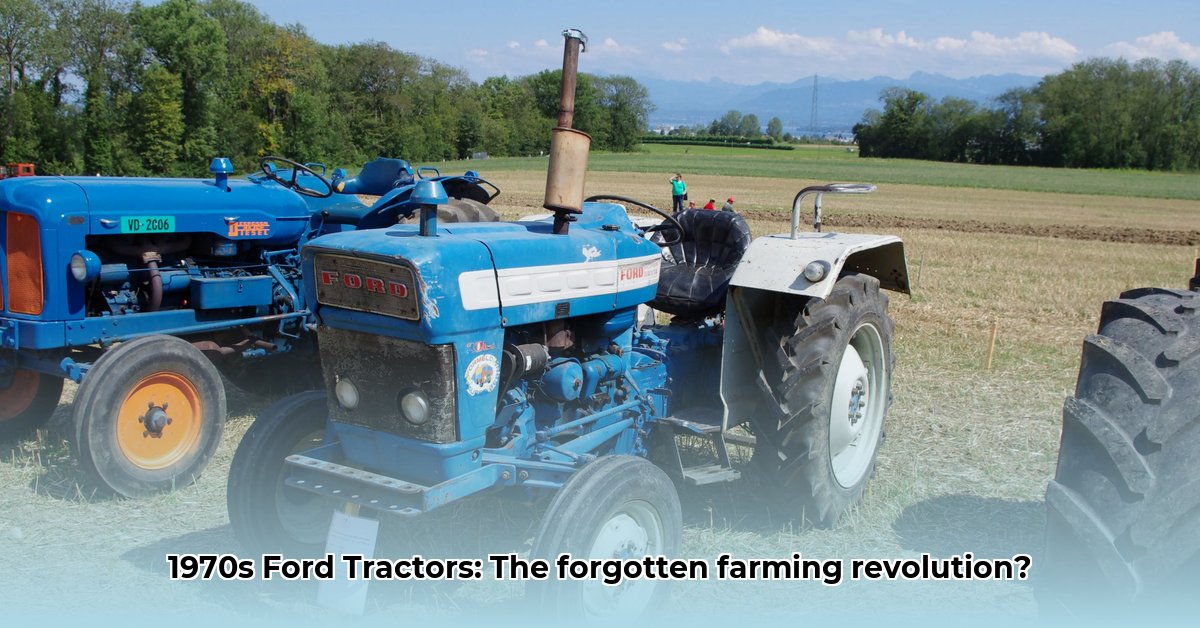
1970s Ford Tractors: A Legacy of Strength and Sustainability
The rumble of a 1970s Ford tractor—a sound echoing in the memories of many older farmers—wasn't merely the soundtrack of a bygone era; it represents a compelling chapter in agricultural history and a surprisingly relevant case study in sustainable farming practices. These robust machines weren't simply about tilling fields; they embody crucial lessons for today's environmentally conscious agriculture. Let's explore why. For more detailed information on specific models, check out this Ford 545D resource.
Wasn't the simplicity and dependability of these tractors a key element of their sustainability? How did their design choices contribute to long-term environmental benefits?
The Technological Leap Forward: Efficiency and Innovation
The 1970s witnessed significant strides in tractor technology. Ford tractors of this decade frequently showcased notable improvements in fuel efficiency compared to their predecessors. This wasn't just about cost savings for farmers; it significantly reduced the tractors' carbon footprint—a critical aspect of modern sustainable agriculture. Imagine a farmer achieving a 20% reduction in fuel consumption—that translates to a substantial decrease in greenhouse gas emissions over a farming season, and cumulatively over the tractor's lifespan.
Beyond fuel economy, advancements in hydraulic systems and transmissions resulted in faster work and reduced physical strain on farmers. This boosted efficiency, allowing for better resource management and less wear and tear on both the land and the operator. This efficiency is a cornerstone of modern sustainable farming—achieving more with less effort is inherently sustainable.
Built to Last: Durability and the Sustainability Equation
Sustainability isn't solely about fuel efficiency; the lifespan of equipment is equally crucial. Many 1970s Ford tractors were renowned for their exceptional durability. Numerous accounts describe these machines running for decades with only routine maintenance. Consider the environmental benefits: reduced manufacturing, transportation, and ultimately, less waste. A tractor enduring 20, 30, or even 40 years significantly reduces its environmental footprint compared to a machine replaced every 5-10 years, regardless of fuel efficiency. This longevity is a pivotal, often overlooked, component of sustainable practices.
Did this durability, however, come at the cost of repairability? How did the ease or difficulty of repairs affect the overall sustainability of these tractors?
The Other Side of the Coin: Repairing the Past
The remarkable durability of these tractors presents a challenge: finding replacement parts for older models can be difficult. While their ruggedness extended their lifespan, sourcing components can be problematic. This highlights a vital lesson for modern sustainable agricultural machinery design: incorporating readily available, easily replaceable parts is paramount. The parts scarcity for older Ford tractors serves as a reminder of the importance of designing repairable equipment—a frequently overlooked aspect of sustainable agricultural practices.
Ford in the Broader Agricultural Context
Ford's influence on the 1970s agricultural landscape is significant. The company's history, including its acquisition of New Holland, reveals a broader trend of industry consolidation. This raises questions about the impact of such consolidation on smaller farms' access to modern and sustainable technologies. Could increased market competition spur further innovation in sustainable equipment? This remains a topic of ongoing discussion and research.
How did the scale and scope of Ford's operations influence the adoption and accessibility of sustainable farming technologies during this era?
Lessons from the Past, Shaping the Future
The 1970s Ford tractor offers a compelling case study in the complex interplay between technological progress, economic realities, and environmental sustainability in agriculture. Their strengths and weaknesses provide invaluable insights for contemporary farming practices. From the fuel efficiency of their engines to the longevity of their construction, these machines advocate for durable, repairable, and efficient farming equipment. By studying the past, we gain crucial lessons that can pave the way for a more sustainable agricultural future.
How to Assess the Environmental Impact of Vintage Ford Tractors
The image of a classic Ford tractor, the scent of diesel—it evokes a simpler time. But are these iconic machines, particularly those from the 1970s, truly sustainable? Determining the environmental impact of these tractors isn't a simple yes or no answer. It requires careful consideration.
Fuel Efficiency and Emissions
1970s Ford tractor engines weren't designed with today's emission standards in mind and consumed more fuel than modern counterparts. However, smaller farms using these tractors often have lower overall fuel consumption than large-scale operations using modern machines. It's a question of scale.
Accurate assessment demands precise data: annual operating hours, fuel type, and regular maintenance to minimize leaks and reduce emissions. Proper upkeep is critical. This makes the evaluation process more nuanced.
Durability and Longevity: A Double-Edged Sword
Vintage Ford tractors are known for their longevity, reducing waste—a considerable environmental benefit. However, this durability may extend their service life, prolonging pollutant emissions. It's a trade-off: an older, reliable machine might last longer but will likely have higher running costs and less efficient fuel consumption compared to a newer model.
Farming Practices – The Missing Piece
The environmental impact isn't solely determined by the tractor itself. Farming practices significantly influence the overall impact. Smaller-scale, organic farming often employs smaller, older tractors, resulting in lower environmental impacts than large-scale operations. Analyzing the broader farming systems—crop rotations, sustainable fertilizers—is just as critical as assessing the machinery.
Assessing Your Own Vintage Ford's Impact
Here's a practical approach:
- Track Fuel Consumption: Meticulously record fuel usage and compare to modern tractors performing similar tasks.
- Maintenance Matters: Regular servicing minimizes leaks and optimizes efficiency, reducing environmental damage.
- Consider Upgrades: Retrofitting with improved air filters or fuel-efficient components can yield measurable improvements.
- Look at the Bigger Picture: Analyze your entire farming operation. Sustainable practices will minimize impact regardless of machinery used.